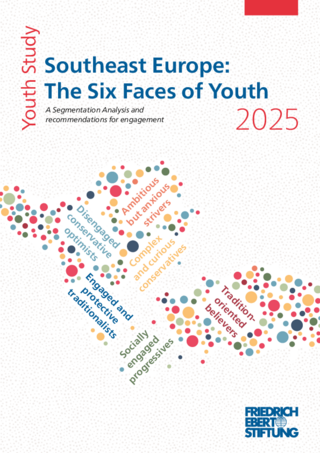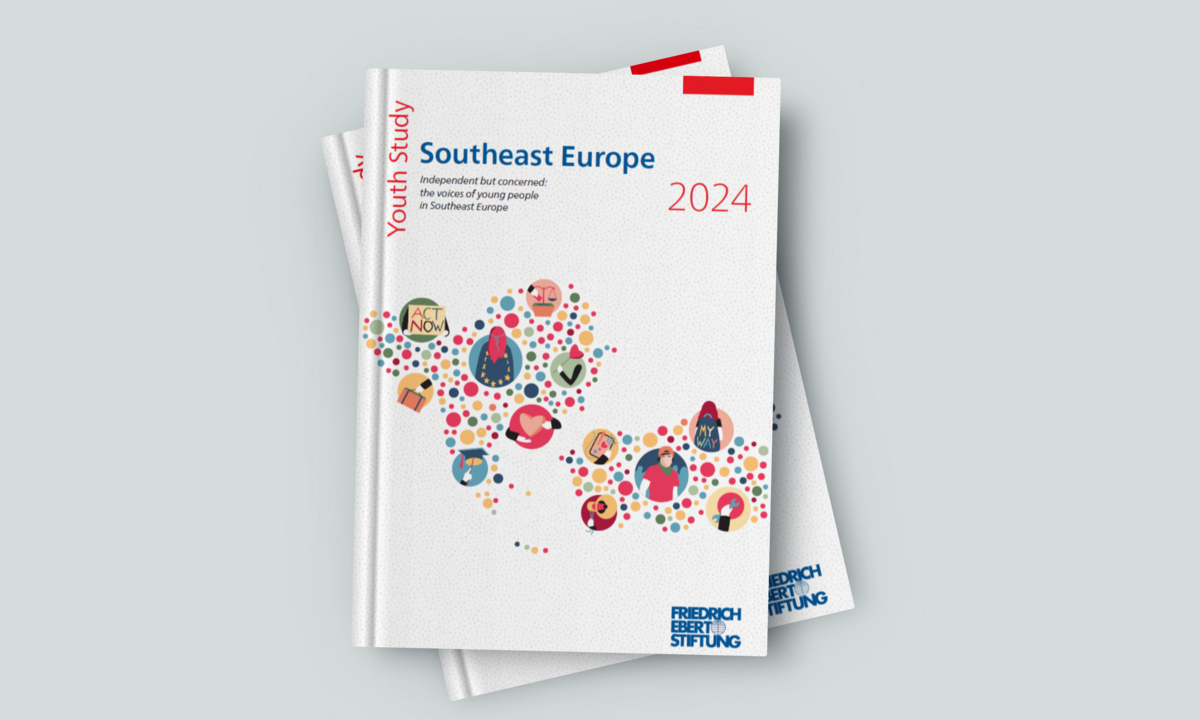
Six Faces of Youth: The Political Landscape of Young People in Southeast Europe
A comprehensive new segmentation study by the Friedrich Ebert Stiftung reveals the political and social attitudes of young people across Southeast Europe, identifying six distinct youth segments that challenge conventional demographic assumptions. Based on survey data from 8,943 young people aged 14-29 across 12 countries, the study demonstrates that attitudes and beliefs matter far more than traditional demographic characteristics in shaping social and political views.
Methodology: Beyond Traditional Demographics
The study employed sophisticated statistical methods including factor analysis, random forest algorithms, and clustering techniques to identify meaningful patterns in youth perspectives. Rather than relying on simple age, income, or education categories, researchers analyzed over 200 survey questions covering demographics, political attitudes, religious beliefs, and social values.
Via Random Forest – a machine learning algorithm based on decision trees, that allows us to investigate simultaneously a multitude of aspects
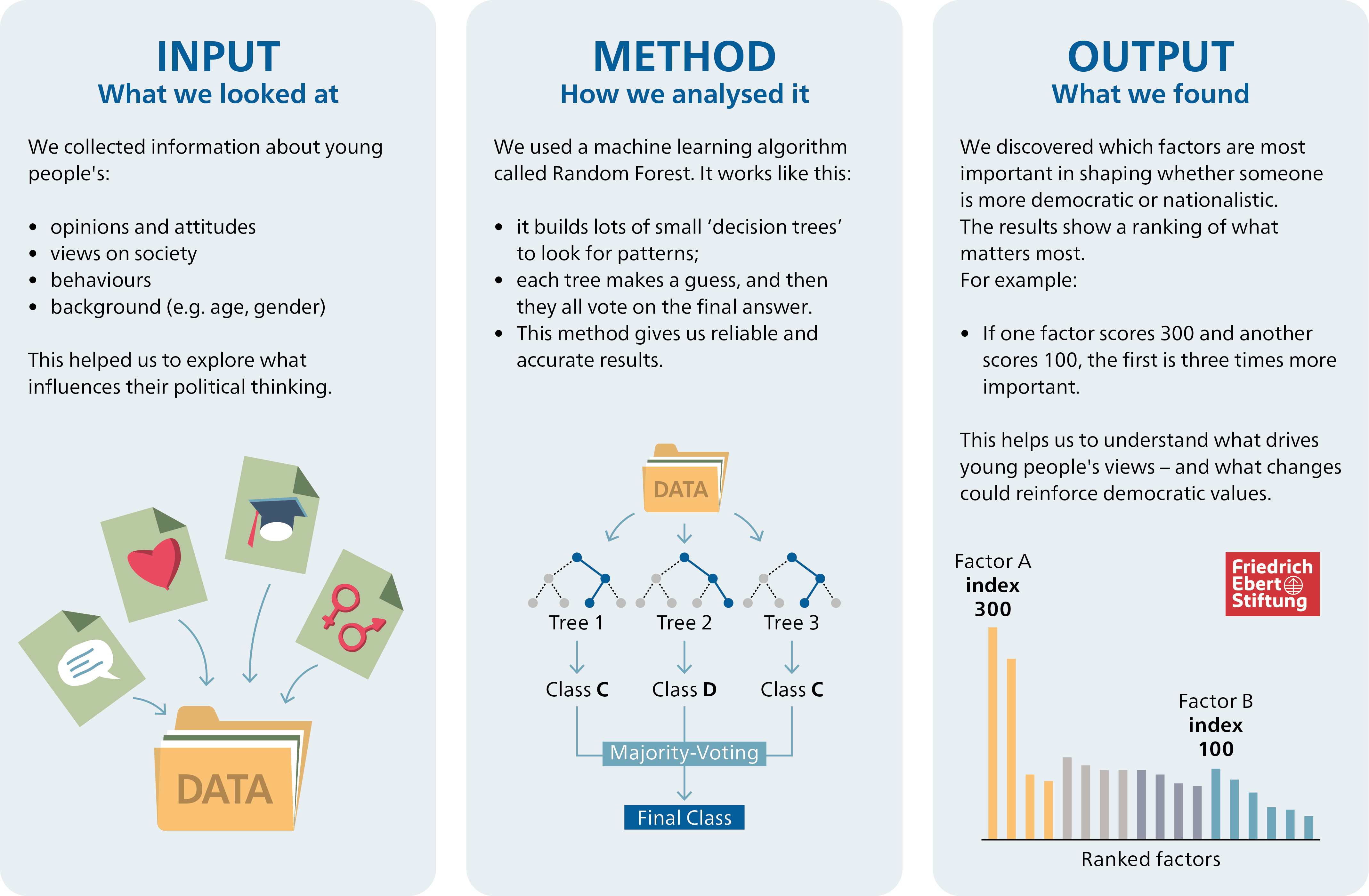
Through this multi-method approach, the analysis uncovered four primary dimensions that shape young people's political attitudes, explaining over 90% of the differences between youth segments:
- Social progressivism vs conservatism (41%) - views on LGBTQ+ rights, minority protections, and social inclusion
- Status-seeking vs ethical orientation (32%) - the balance between personal ambition and moral principles
- Optimism vs pessimism (15%) - confidence in the future and institutional effectiveness
- Patriarchal and security-oriented vs altruistic and security seeking (8%) - attitudes towards law enforcement, public safety, and state authority
The percentages shown for each dimension represent how much each contributes to explaining the differences between youth segments. Values in %
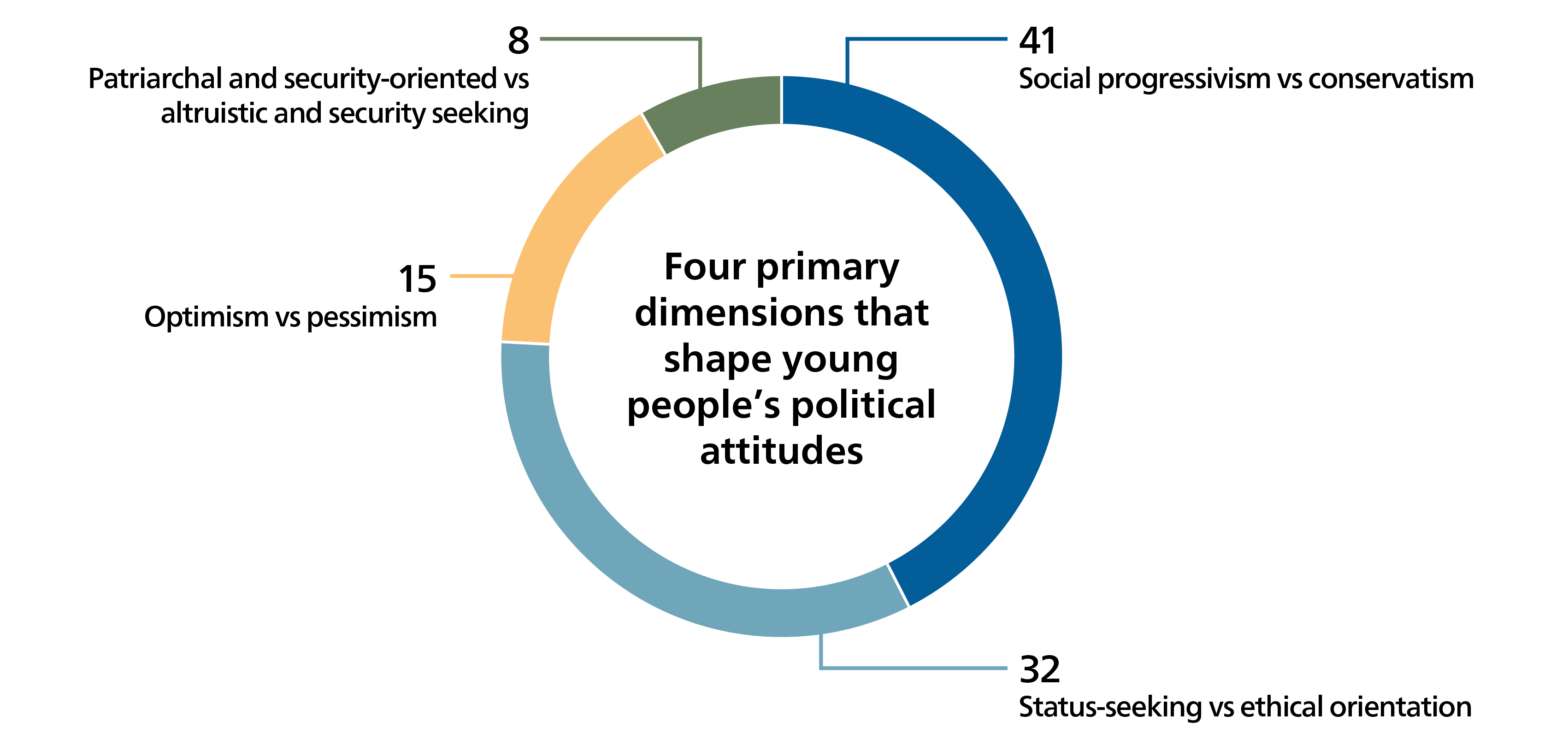
The Six Youth Segments: A Detailed Analysis
1. Tradition-Oriented Believers (23.7%)
The largest segment consists primarily of highly religious young, married women who prioritize family and security. Despite educational aspirations, they exhibit anxiety about economic instability and lean toward strong leadership for protection. This group is particularly prominent in Bosnia and Herzegovina (37%), Serbia (27%), Albania (27%), and Turkey (27%).
Key characteristics: 60% female, strong Orthodox Christian or Muslim beliefs, well-educated with substantial time spent on academic pursuits, heavy social media engagement, family-oriented with early marriage aspirations, and conservative social views including belief that LGBTQ+ communities have too many rights (36.4% vs regional average of 28.2).
Political attitudes: Slight right-wing lean with strong trust in religious institutions (47.9%), army (52.5%), and police (43.6%), but distrust of democratic institutions. Prefer strong leadership and are willing to accept limitations on civil liberties for security.
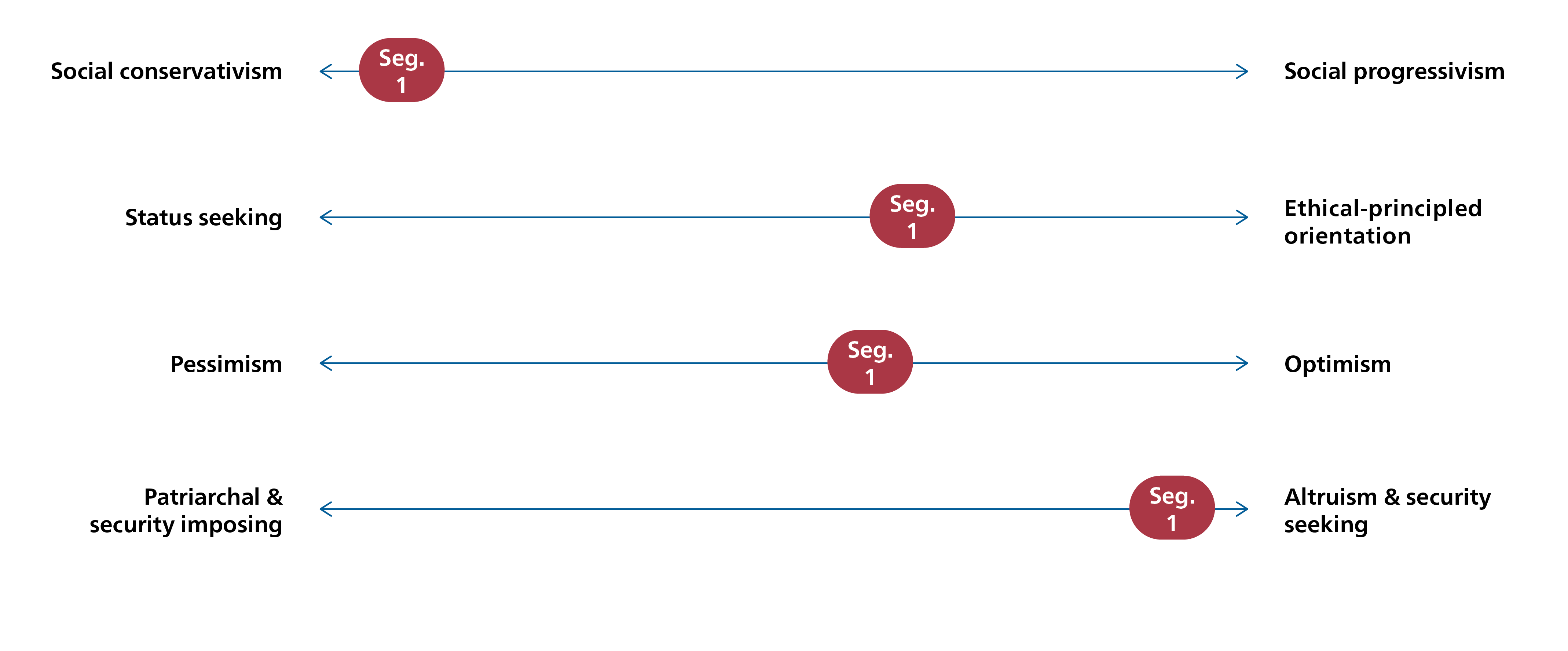
2. Disengaged Conservative Optimists (16.6%)
Dominated by young men from rural areas with limited education but high institutional trust. While politically polarized through social media influence, they maintain optimism about the future despite low formal political engagement. This segment dominates in Kosovo (46%) and Albania (39%), but represents only 7% of youth on average across all other countries in the sample.
Key characteristics: 66% male, predominantly rural (36% rural village vs 28% regional average), low education, unemployed or job-seeking, substantial free time spent on social media, prioritize personal well-being and family over career ambitions.
Political attitudes: Extremely low political interest (11.6% vs 16.8% regional average), but highly polarized toward far-left (17.3% vs 7.6% regional average) or far-right (8.8% vs 7.5% regional average) positions. High trust in traditional institutions like army (58.4%), police (47.8%), NATO (51.7%), and EU (50.5%). Despite low engagement, they exhibit high optimism with 89.1% (vs. 79.1% regional average believing their personal future will be better than now.
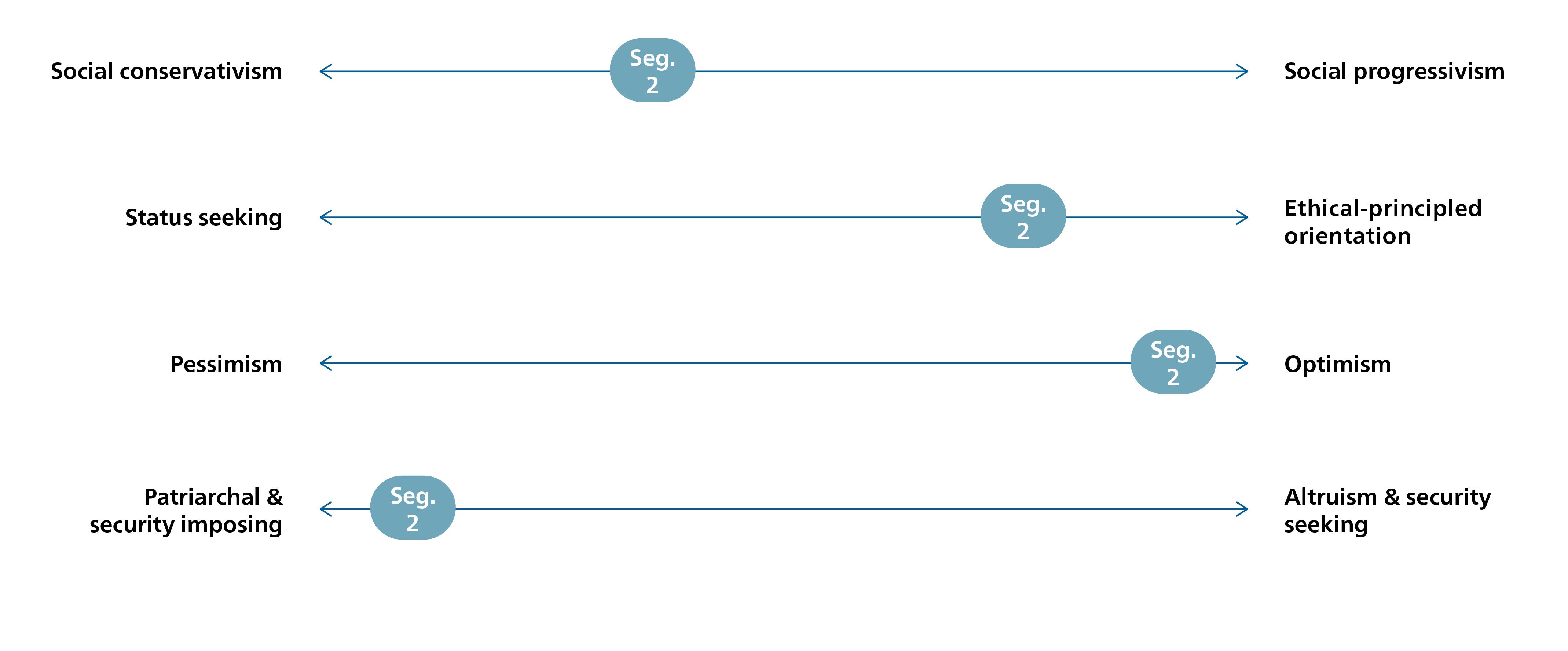
3. Ambitious but Anxious Strivers (18.0%)
Financially struggling teenagers with materialistic drives and progressive social views. Despite economic challenges, they support greater rights for minorities and LGBTQ+ communities, representing a paradox of traditional values combined with inclusive attitudes. Most prevalent in Turkey (26%), Bulgaria (22%), and Romania (22%).
Key characteristics: 52% female, youngest segment (36% aged 14-18), balance school with paid work, financially struggling but maintain materialistic aspirations, high importance placed on wearing branded clothes (40.1% vs 30.3% regional average).
Political attitudes: Progressive social attitudes - only 21.0% believe LGBTQ+ community has too many rights (vs 28.2% regional average), support for women's and minority rights, and institutional skepticism. Trust political parties (17.4% vs 8.1% regional average) and parliament (22.9% vs 12.7 regional average) more than average, but distrust army, NATO, and EU.
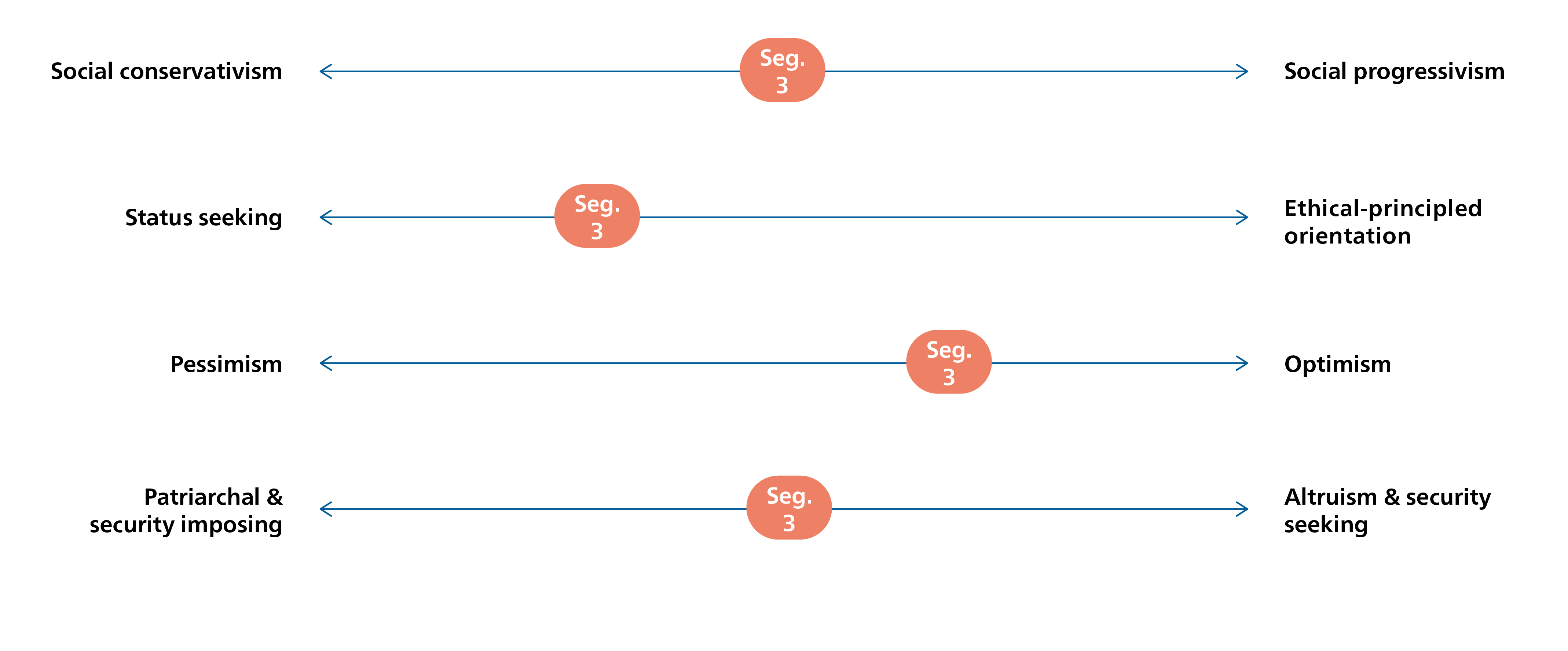
4. Engaged and Protective Traditionalists (11.7%)
Economically stable young men aged 25-29 driven by conservative, nationalist values. Highly politically active but distrustful of democratic institutions, they are largest in Serbia (26%), North Macedonia (24%), and Bosnia and Herzegovina (24%).
Key characteristics: 68% male, older (42% aged 25-29), higher education, financially stable, family providers, strongly religious (Orthodox Christian), right-wing political orientation.
Political attitudes: Highest political engagement - 34.9% interested in politics (vs. 15% regional average. Deep distrust of all political institutions, with the exception of religious institutions, but strong nationalist sentiment. Believe ethnic minorities (35.6% vs. 18.9% regional average) and LGBTQ+ community (59.7% vs. 28.2% regional average) have too many rights, as well as that Jews have too much influence in their country (22.1% vs. 13% regional average).
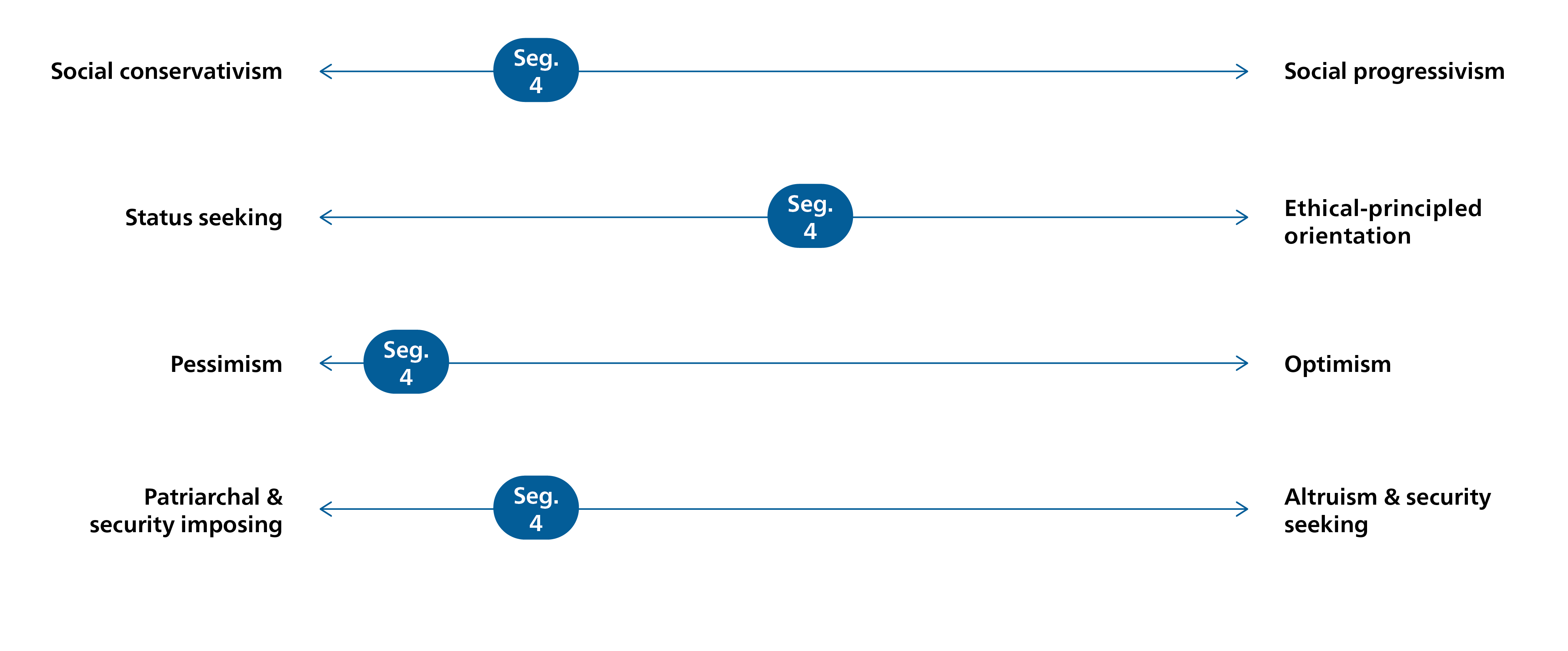
5. Complex and Curious Conservatives (14.0%)
Young men straddling traditionalism and modernity. Financially constrained yet adventurous, they combine conservative politics with openness to cultural exchange. This segment shows relatively stable presence across countries, though smaller in Albania and Bosnia and Herzegovina.
Key characteristics: 64% male, aged 19-24 (44%), financially struggling but adventurous, high desire for travel and new experiences, willing to engage in corrupt activities for personal benefit more than the average, and politically active despite economic challenges.
Political attitudes: High interest in politics (27.2% vs. 16.6% regional average), right-wing orientation, high trust in all institutions including political parties (27.8% vs. 8.1% regional average), strong support for dictatorship over democracy under certain circumstances (36.0% vs. 21.4 regional average). Paradoxically combines conservative views with some openness to diversity in the form of cultural exchange and personal growth.
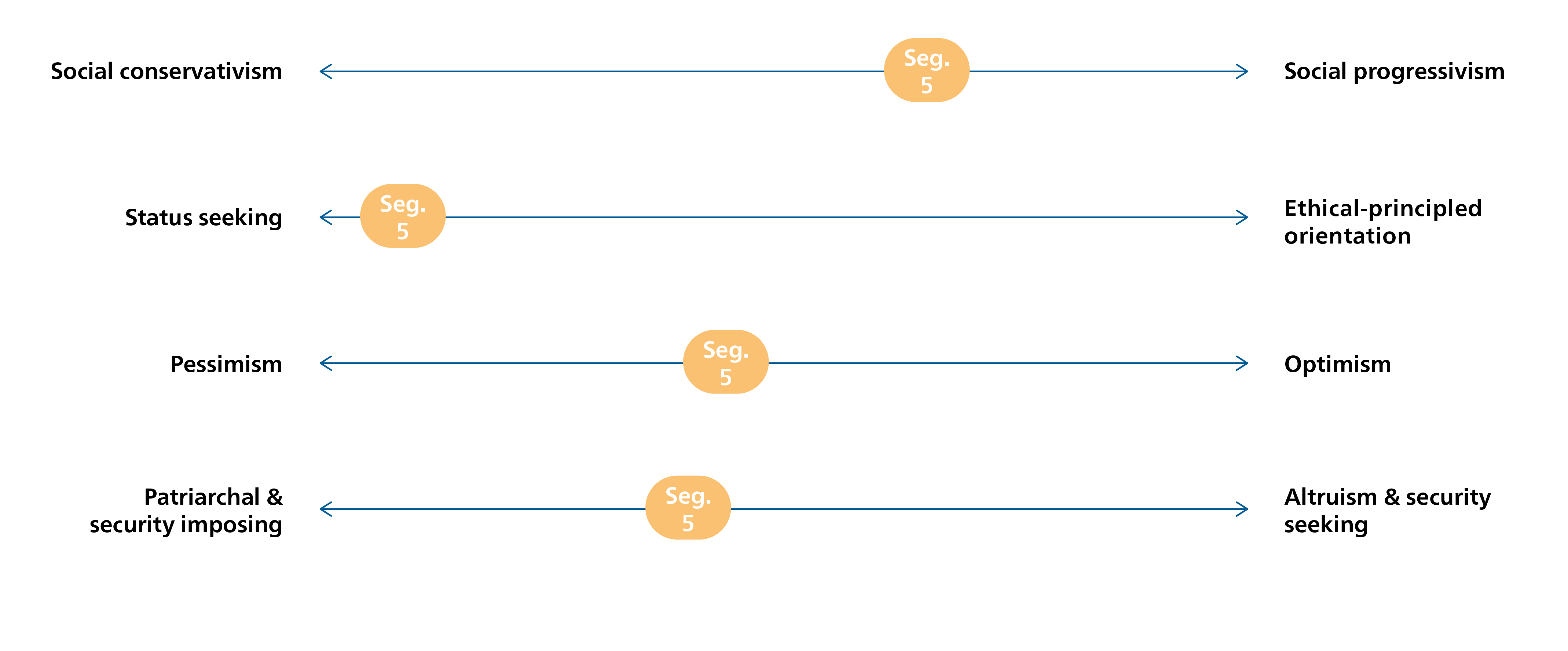
6. Socially Engaged Progressives (16.0%)
Highly educated urban women championing social justice and human rights. Despite financial comfort, many desire emigration for professional growth and cultural opportunities. They are found mainly in EU Member States such as Greece (31%), Slovenia (26%), Croatia (23%) and Romania (20%), but surprisingly are much less present in Bulgaria (10%).
Key characteristics: 67% female, highly educated, urban (63% living in cities), financially comfortable, dedicated to personal and professional growth, strong pro-European identity (57.3% see themselves as European vs 45.5% regional average).
Political attitudes: Left-wing orientation, high support for same-sex marriage (68.9% vs. 13.5% regional average) and abortion rights (30.1% believe that abortion is "always" justified vs. 8% regional average). Strong democratic values but low trust in political institutions, with the exceptions of EU and civil society organizations. High emigration intentions driven by professional and cultural aspirations.
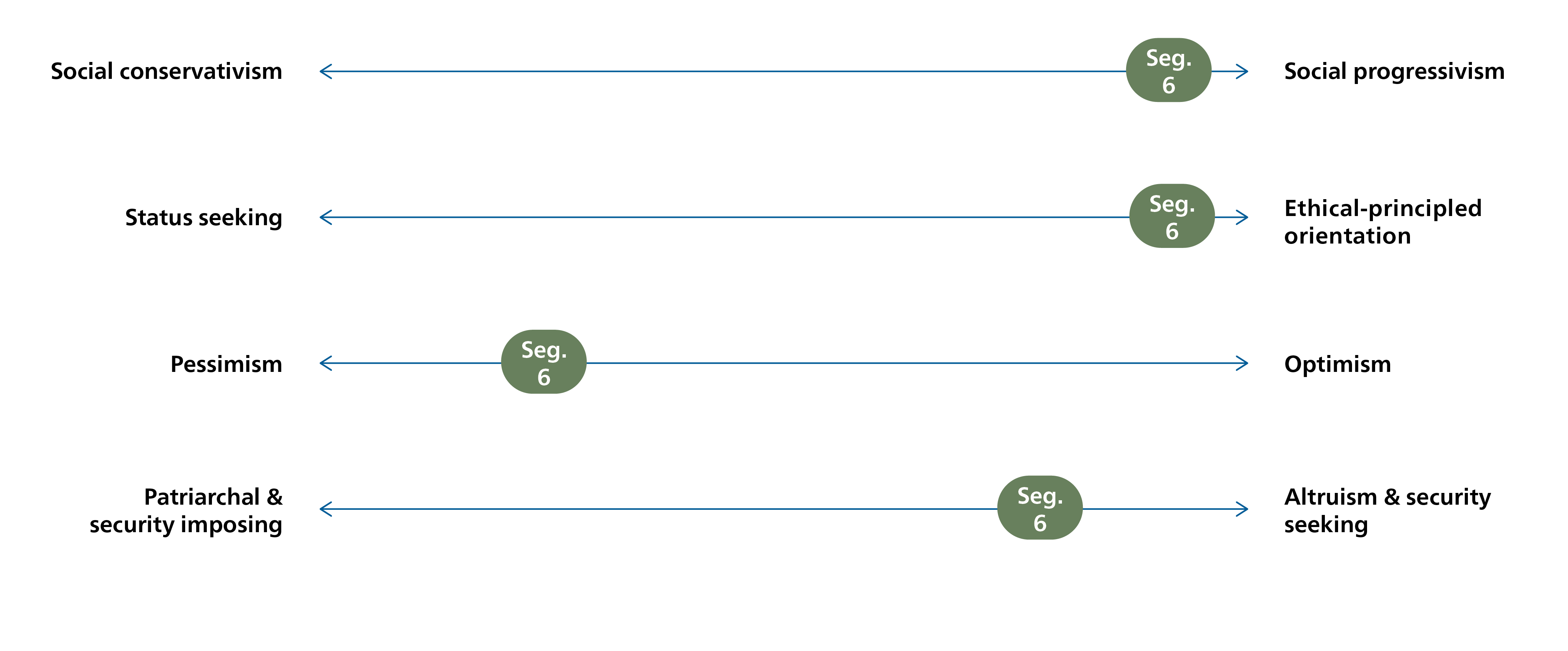
Key Findings and Regional Variations
Geographic Distribution and Cultural Patterns
The study reveals significant regional patterns that reflect historical, economic, and cultural differences across Southeast Europe. Western Balkan countries show higher concentrations of tradition-oriented believers and disengaged conservative optimists, while EU member states have more socially engaged progressives.
Values in %
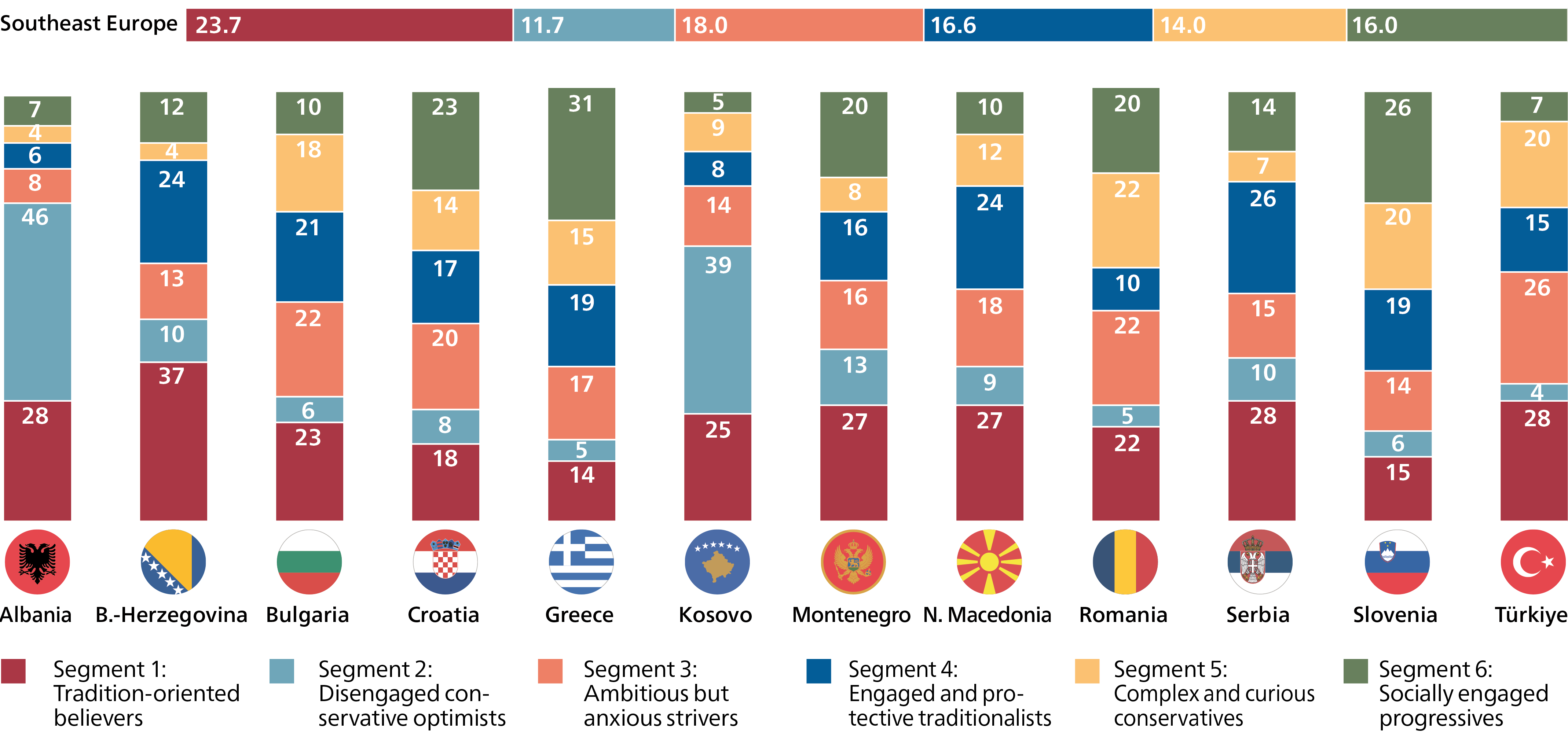
Cross-Cutting Trends and Driving Forces
Gender Disparities: The analysis confirms global trends of growing gender gaps in political orientation, with young men increasingly shifting right while women align with progressive ideologies. This is particularly evident in segments 4 and 6, which are heavily gender-skewed.
Economic Impact: Financial hardship emerged as an important driver of political views, significantly impacting attitudes toward democracy and institutions. However, the ambitious but anxious strivers segment exemplifies how economic struggles can coexist with progressive social values.
Social Media Influence: The study identifies social media as a significant factor in political polarization, especially among rural, less educated young men. This is particularly concerning for democratic engagement and suggests the need for targeted interventions.
Implications for Policy and Engagement
Key Challenges:
- Countering right-wing messaging that thrives on emotionally charged content
- Addressing brain drain as educated progressives seek opportunities abroad
- Building trust among economically struggling youth who show progressive social values
- Engaging first-time voters before political habits crystallize
Strategic Recommendations:
- Provide economic dignity through fair wages, stable jobs, and affordable education across all segments
- Develop targeted messaging with segment-specific content addressing unique fears and aspirations
- Actively challenge algorithm-driven division with emotionally resonant progressive narratives
- Implement early engagement before political disengagement sets in
- Create policies that retain talent while supporting professional growth
Future Implications for Southeast Europe
As Southeast Europe continues to navigate its path between East and West, the perspectives of its youth will play a crucial role in determining the region's democratic future. The study reveals both concerning trends—such as growing authoritarianism among some segments—and hopeful signs, particularly the inclusive values of the ambitious strivers and the democratic commitment of socially engaged progressives.
The research underscores that effective youth engagement requires moving beyond assumptions to understand the lived experiences, values, and aspirations that truly drive political behavior. The six segments identified represent not just statistical clusters, but distinct communities with real needs and concerns that demand tailored policy responses.
Most critically, the study demonstrates that young people's political preferences are not fixed by demographics but are shaped by interactions between economic circumstances, social values, institutional trust, and media consumption. This suggests that with appropriate interventions, democratic movements can still engage and mobilize young people across the political spectrum.
About the Research
This analysis draws from the Friedrich Ebert Stiftung's "Youth Study Southeast Europe 2025: Segmentation Analysis" authored by Elena Avramovska, Semir Dzebo, and Johanna Lutz. The representative survey was conducted by IPSOS between February-March 2024, comprising 8,943 interviews with young people aged 14-29 across Albania, Bosnia and Herzegovina, Bulgaria, Croatia, Kosovo, North Macedonia, Montenegro, Romania, Serbia, Slovenia, Greece, and Turkey.
Avramovska, Elena; Dzebo, Semir; Lutz, Johanna
Youth study Southeast Europe 2025
Vienna, 2025
Download publication (4 MB, PDF-File)
